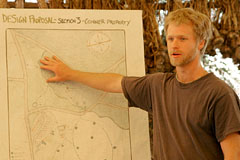Skill Building at the Bullock Permaculture Homestead
We have decided to end our Skill Building Program. There will no longer be applications available. The information below is archival in nature.
When?
N/A.
What?
Our Skill-Building Program is an educational experiance focused on group planning, decision-making, and collaborative work-learning in a doer's environment. The self-directed work projects and mentorship goals of skill-builders differ season to season. Consequently, the program is different every year. The Skill-Builder Program has three main facets:
1) Annual Gardening, 2) Perennial Zone Management, and 3) Rotating Monthly Specializations.
-
We grow our own food here. You’ll be eating the potatoes, squash, apples and canned goods from last year when you get here in the spring, growing food for the season, and making sure there’s food in storage or overwintered for the following season’s incoming crew! Each Skill Builder has 6-8 garden beds that they are responsible for. Our emphasis is on small-plot intensive gardening, so you will learn how to grow a lot of food in a small space, and will be expected to love and maintain your gardens in order to feed your community!
-
The Bullock’s homestead is a living plant genetic repository, with hundreds of novel species from all over the world, most of which have value as food, fodder, fiber, medicine, timber, etc. Across the homestead, there are dozens of microclimates and niches that have been planted with perennial plants and trees. Your task will be to learn about a parcel of it - your Perennial Zone - and keep it thriving. You will learn about the plants in your zone and their needs and uses. You’ll also learn how to manage these types of landscapes with pruning, irrigation, and fertility. You’ll also get to experiment with what plants you think might work there by planting new plants from our nursery and seeing what happens there.
-
We have rotating monthly specializations for learning about the systems on our homestead. This includes mechanics, water systems, poultry management, plant propagation and nursery care, sprays (fertility and holistic pest management), compost, and more. As a skill-builder, you will be able to take on most of these monthly specializations, and spend a month delving into what it takes to troubleshoot problems with the farm truck, fixing water pumps, taking care of chickens and ducks, or experimenting with compost teas, among other things.
Once these three facets of life here are taken care of, there is space to study our off-grid systems, and design a project of your own undertaking. Interested in solar power? Build a thermosyphon shower or design a new solar system for the kitchen. Interested in fire power? Design and build a rocket stove. How about carpentry? Build an arbor or new tool shed.
You’ll have access to a fully-stocked library, wood shop and metal shop and the guidance of the Bullock Brothers with their years of DIY experience.
Hosting:
Another major component of living and working here is hosting visitors. We have an array of people coming most weekends to see the place. Some folks just wander in and look around, some come for a tour, but most will stay for the weekend and you will be helping include and integrate them into daily life and tasks around the farm. There are also a handful of larger groups that come, 12-30 people (such as our 2-week Permaculture Design Course), for our various courses and other weekend events. This is an opportunity to learn how to host, lead work parties, network, and meet great people.
Courses:
Two or three yearly permaculture courses are taught at the homestead: Introduction to Permaculture, 2 Week Permaculture Design Course, and Advanced Permaculture Design Course. Skill-builders who have not yet taken a PDC may take the 2-week course, tuition free. Likewise, without cost, those who have previously taken a PDC are encouraged to take the Advanced Course. The Intro Course is a great sampling, or a refresher, for all during the spring. The week preceding, and throughout the duration of these courses, skill-builders are expected to be present. The preparation for and faciliation of these courses on the homestead is an all-hands-on-deck effort.
What does a typical day look like here? (We work Friday-Monday - what we call our "Structured Days" - with the remainder left unscheduled, or "Unstructured.")
Well, “typical” changes with the season and the interests of the group. That said, a daily schedule might look something like this:
7:30 - Breakfast (we take turns cooking for each other, about 2 meals a week per person)
8:30 - Morning meeting - What projects should we do today? What should we learn? Discuss the needs of the homestead and direct work projects accordingly.
9:00 - Move out into morning work projects: plant some over-wintering cabbage, prep a garden plot, prune prunes perchance, learn to make kraut and jam
12:30 - Lunch, personal projects, take a nap, go for a swim in the pond...
2:00 - Meet back up, assess finished & unfinished morning tasks, and briefly check-in about afternoon work projects
2:15 - Afternoon work projects (time-allowing, phase into monthly specialisation-related tasks, annual garden/perennial zone-time, and farm-related personal projects)
5:30 - Water your garden beds, work on a bicycle-powered blender, go study grape pruning in the library, make a hatchet handle, start cooking dinner, etc…
6:30 - Dinner
7:30 - Back to your bike blender, have a solar shower, get cozy in the sauna, make a fire and sip some tea or homemade wine, however else you like to spend the rest of your day.
Unstructured Days (Tuesday through Thursday):
These unscheduled days are designed to give skill-builders the opportunity to self-manage time between the following: personal gardens and perennial zones, self-directed work projects, paid-work opportunites, and personal time.
Skill Development Through Projects:
Our projects provide hands-on experience in many of the following skill areas: organic gardening, grafting, pruning, electrical, plumbing, irrigation, metalworking, carpentry, nursery management, pond construction, mushroom propagation, ferrocement construction, canning & food preservation, cooking, working with small animals, plant propagation, bee keeping, pedal-powered machines, solar hot water systems, photovoltaic systems, natural building, mechanical maintainence, and more.
Some past projects made by Skill-Builders:
- Solar-powered music station
- Compost tea brewer
- Timber-frame structures
- Wood-fired and thermo-syphon showers
- DIY water tanks
- Rebuilt water pumps
- Chicken tractors
- Arbors & Trellises
- Bike-powered tools
- Bee Hives
- Solar dehydrator
- Sauna
- Furniture
- Rocket stoves
- Cob oven
- Rock walls
- Irrigation systems
- Photovoltaic systems
Expenses?
We ask each of our participants to contribute $250/month to our land fund. Land fund money is allocated each month to the interns' bulk food purchases and propane costs; and is used to supply and maintain tools and materials for our projects. Visitor meal donations, and meal-costs for hosting large groups likewise go towards the intern food kitty. Opportunities to earn money abound on the island, from landscaping and gardening, to orchardwork and hardscaping.
Where Would I Stay?
We have numerous platforms and other small structures available scattered about the property. We supply the space and a tarp for rain cover; you supply: mosquito net, sleeping bag, pad, blankets, etc. Meals are prepared together in our community kitchen.
Application Procedure & Timeline
Sorry, All, but we have decided to stop offering our Skill Building Program.
Questions?
If you have further questions regarding the skill building program please contact us at skillbuilding@permacultureportal.com.







